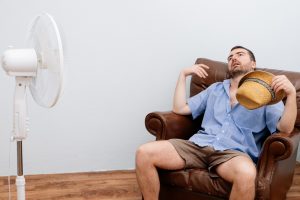 At Malek Heating & Cooling, we understand that helping people find ideal comfort in their homes means more than ensuring they have an air conditioning and heating system that will provide the right temperatures around the year. It also means finding the correct balance of relative humidity, keeping the air from becoming too muggy or too dry. That’s why we install both whole-house humidifiers and whole-house dehumidifiers for our customers’ homes.
At Malek Heating & Cooling, we understand that helping people find ideal comfort in their homes means more than ensuring they have an air conditioning and heating system that will provide the right temperatures around the year. It also means finding the correct balance of relative humidity, keeping the air from becoming too muggy or too dry. That’s why we install both whole-house humidifiers and whole-house dehumidifiers for our customers’ homes.
But what is “relative humidity”? It’s a phrase you’ve probably heard before, yet not known exactly what it means or why it’s important when it comes to comfort. Let’s take a look at this term and why high and low relative humidity can both be problems.
Relative Humidity and Absolute Humidity
Relative humidity is a type of measurement of the amount of water vapor in the air. But to understand the measurement of relative humidity, you have to first understand another measurement, absolute humidity.
Absolute humidity is basically a way of saying “how much water vapor is there in the air?” Take the mass of water vapor in a volume of air at a given temperature and divide it by the mass of dry air. The set temperature is important, since the hotter the air, the more water it can hold.
Now we can measure relative humidity. Take the current absolute humidity in the air and divide it by the highest possible absolute humidity (which, as mentioned above, changes based on temperature). The result is expressed as a percentage. If relative humidity is 100%, it means the air is at maximum saturation and it’s probably raining.
How This Affects You
The reason humidity has an effect on comfort is that the more moisture in the air, the slower the human body is able to release heat through sweating. Perspiration doesn’t evaporate easily when there’s a large amount of moisture in the air, which means that more heat is trapped in the body and the temperature feels hotter than it actually is. With lower humidity, heat escapes faster, making the human body feel cooler, which is fine in summer but not in winter. Both high and low humidity can have other consequences, such as the development of mildew and mold (high humidity) and the easy spread of cold and flu bugs (low humidity)
Balancing Relative Humidity
What’s the ideal relative humidity level for comfort? We recommend 45%. Below 30% can result in unpleasantly dry conditions leading to skin and eye irritation; above 60% and the air will start to turn swampy. Humidifiers and dehumidifiers aim for the ideal 45% target.
It’s best to leave installation of whole-house humidifiers and dehumidifiers to professionals. This way you’ll ensure that your relative humidity control system won’t push your home too far the wrong direction: putting in a humidifier to solve dry summer air but which ends up turning the home into hothouse isn’t any type of solution!
If you’re looking for better indoor air quality in Wilmette, IL this summer and the seasons ahead, whether it’s a humidifier/dehumidifier or basic air filters, contact our team today.
Malek Heating & Cooling has served the Chicagoland area since 1998.